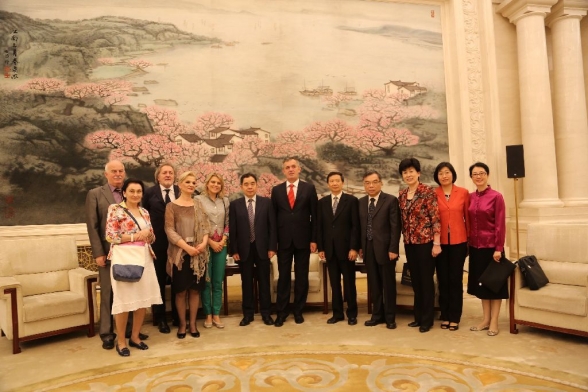Upon the invitation of the Committee on Education, Science, Culture and Public Health of the National People's Congress, Delegation of the Committee on Education, Science, Culture and Sports, composed of Ms Branka Tanasijević, Mr Srđa Popović, Mr Draginja Vuksanović, Mr Jelisava Kalezić and Mr Radosav Nišavić, paid a visit to China, in the period 1-7 June 2014.
In the National People's Congress, Delegation of the Committee met with Committee on Education, Science, Culture and Public Health of the National People's Congress, while in the Ministry of Education, the Delegation had a meeting with Ministry’s experts in charge of elementary, high and university education. Additionally, in Peking, the Delegation visited the Peking University.
During the visit to the National Republic of China, Delegation of the Committee also visited Shanghai where they had meetings with representatives of standing Committee on Education of the National Congress of Shanghai and Committee on Education, and members of Delegation also had opportunity to visit the elementary school “Seven colour flower” which is one of the best in Shanghai. Also, during the stay in the National Republic of China, the Delegation visited cultural and sport institutions in Peking and Shangai.
Delegation of the Committee had an opportunity to be acquainted with Chinese educational system in general, and specifically with the education system of Shanghai, whose students at the global level consistently achieve the best results. Essentially, the reason why Chinese educational system is one of the most successful in the world is the quality of teachers, so the countries with highly developed educational system place accent on the manner of choosing and training teachers, whose task is to transport knowledge. .
Allocations for education are the biggest expenditure in the central budget of the National Republic of China and Government’s policy is to increase the percent of allocation every year. In line with that, the exceptional results of students from Shanghai at PISA testing result from the fact that children are taught that education is very important and parents direct them to think that their future depend on the education. The second reason is that China, contrary to under-developed countries, invests more in quality of education, i.e. takes care of quality not quantity.
Interlocutors from the National Republic of China voiced pleasure over the visit, wishing this very successful cooperation to be continued at all levels and in all fields.









